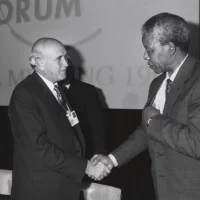Jean Bédel Bokassa ruled as President-for-life and later as Emperor of the Central African Republic from 1966 to 1979. In his youth he served in the French Colonial Army earning the rank of captain fighting in what would become Vietnam. Bokassa’s erratic and sometimes brutal regime began after he seized power in a military coup,… Read More "Jean Bédel Bokassa: The Man who Would be Emperor"
A House of Cards – The Collapse of Yugoslavia
Over a bloody three years, hundreds of thousands of former Yugoslav residents were dislocated, imprisoned, raped, tortured, starved, and massacred as Serbian nationalists pursued an agenda of ethnic cleansing and carved out a homeland for his own people. The violence grew from the ruins of the Socialist Federal Republic of Yugoslavia, a conglomeration of Serbs,… Read More "A House of Cards – The Collapse of Yugoslavia"
“There Will be Blood:” The British Recapture the Falklands
The Falklands War began as a tragically misguided game of smoke and mirrors, designed to inflame Argentinian patriotism and redirect attention away from internal crises. As economic stagnation and vocal dissatisfaction with the ruling military juntas persisted, General Leopoldo Galtieri and Admiral Jorge Anaya orchestrated an unprovoked invasion of the Falklands, a thinly populated archipelago… Read More "“There Will be Blood:” The British Recapture the Falklands"
Known as the ‘Giant of Africa,’ Nigeria stretches across the continent like a patchwork quilt, sewn together from dozens of historically independent religious, ethnic and linguistic subgroups, all vying for political representation and control. After achieving independence in 1960, the infant nation struggled to maintain a fragile peace as members of the Muslim Hausa-Fulani ethnic… Read More "The Famine in Biafra — USAID’s Response to the Nigerian Civil War"
“The Six-Day Miracle”: The 1967 War and How It Changed Israel
“This is a fight for the homeland – it is either us or the Israelis…. Any of the old Palestine Jewish population who survive may stay, but it is my impression that none of them will survive.” — Ahmad Shukeiri, June 1, 1967 Four days after Shukeiri, the first Chairman of the Palestine… Read More "“The Six-Day Miracle”: The 1967 War and How It Changed Israel"
Managing a Massacre: The Ramifications of Tiananmen Square
The Tiananmen Square Massacre of June 1989, and the subsequent months of intimidation, deception and violence, shattered the façade of Chinese political solidarity and severely damaged Sino-American relations. The crackdown followed weeks of protests after the death of reformist leader Hu Yaobang, when tens of thousands of peaceful protesters gathered in Tiananmen Square to demand… Read More "Managing a Massacre: The Ramifications of Tiananmen Square"
The Strange Case of Ngo Dinh Can
It sounds like a scene out of a movie: a corrupt dictator attempts to flee the country with the help of the American Consul, but is stopped by a CIA agent who arrests him. However, this is a very real event that took place in Vietnam in the fall of 1963. While his brother, Ngô… Read More "The Strange Case of Ngo Dinh Can"
Caught in a Honeypot – Marine Clayton Lonetree Betrays His Country
Marine Security Guard Clayton Lonetree was seduced by a Russian woman, “Violetta Seina,” at the annual Marine Corps Ball in November 1985. She worked as a telephone operator and translator for Embassy Moscow but lived a double life as a KGB agent. Lonetree was so highly regarded that he was chosen to be part of… Read More "Caught in a Honeypot – Marine Clayton Lonetree Betrays His Country"
May 9th, 1994 marked one of the most significant – and previously unimaginable – milestones in modern African history as Nelson Mandela was inaugurated as President of South Africa. A key figure in the African National Congress (ANC) since the early 1950’s, Mandela was repeatedly arrested for seditious activities. Although initially committed to non-violent protest,… Read More "Nelson Mandela’s Road to the Presidency"
The Fall of Dien Bien Phu and the Rise of U.S. Involvement in Vietnam
Dien Bien Phu was a major battle of the first Indochina war in which the French fought against the Viet Minh communists. The French objective had been to support the soldiers at Dien Bien Phu, deep in the hills of northwestern Vietnam to cut off Viet Minh supply lines into neighboring Laos. The Viet Minh, however, were able… Read More "The Fall of Dien Bien Phu and the Rise of U.S. Involvement in Vietnam"


